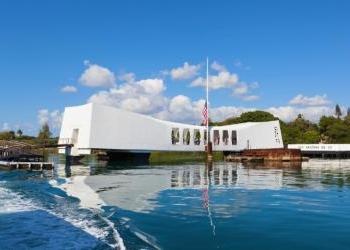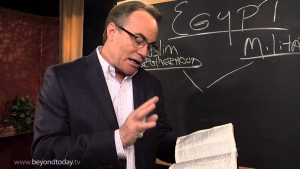I have a ritual every year on Memorial Day. I pop into my VCR an animated Peanuts special entitled, What Have We Learned, Charlie Brown ?
It's a program that takes the beloved Peanuts characters on a tour of
famous European battlegrounds. Their tour includes a visit to Flanders
fields from World War I where, according to the poem, “The poppies grow,
between the crosses row on row.” The words of this haunting poem
continue, “We are the Dead. Short days ago we lived, felt dawn, saw
sunset glow, loved and were loved, and now we lie in Flanders fields.”
Sadly, mankind did not learn the lesson from this “War to End All Wars.” Just 21 years later the world plunged into another global war. The Peanuts characters move on to the scene of a great battle of that conflict—Normandy, where allied troops stormed the French beaches to begin the liberation of Europe from Nazi control. While looking over the calm white beaches and rocky cliffs, scenes from the invasion are superimposed. The characters walk through the American cemetery where thousands of young soldiers are buried. This plot of land was permanently deeded to America by the French government.
While walking among the graves, the words of Dwight Eisenhower, who commanded the allied forces that June morning, serve as a fitting testimony to the action. Former President Eisenhower had returned to Normandy 20 years after the invasion and recorded a documentary for American television.
He said, “Many thousands of men came here to storm these beaches for one purpose only. Not to gain anything. Not to fulfill any ambitions that America had for conquest. But just to preserve freedom, systems of self-government. Many thousands of men have died for ideals such as these. In the 20th century for the second time America, along with the rest of the free world, had to come across the ocean to defend those same values. But these young boys…over whose graves we have been treading… never knew the great experiences of going through life. I devoutly hope that we never again have to see scenes as these. I pray, think, hope that humanity will have learned more than we learned up to that time. We must find some way to work for peace and…gain an eternal peace.”
Indeed, “What have we learned?” Wars and conflicts continue to create new graves with the same echoes of unrealized hope. In this issue we continue to point our readers to those areas of the world that will make the headlines of the future. Europe continues shaping its destiny as a global power. Our lead article gives you an analysis of the recently revealed draft of the European constitution, another milestone along the path to a European federation. While many leaders hail this as a positive step toward global cooperation, Bible prophecy indicates otherwise.
The search for peace in the Middle East remains elusive. Fresh from victory in Iraq, the United States is engineering a game plan towards establishing order and stability for this volatile region. We again point you to what the Bible says will transpire in Jerusalem prior to Christ's coming.
What have we learned? Not enough to bring peace among nations. We continue to look and wait with hope for the time when Christ will restore a government of peace upon the earth as described by the prophet Isaiah. It is his thoughts found in Isaiah 2:4 that offer us a different future. Those words state, “Nation shall not lift up sword against nation, neither shall they learn war anymore.” —WNP
Sadly, mankind did not learn the lesson from this “War to End All Wars.” Just 21 years later the world plunged into another global war. The Peanuts characters move on to the scene of a great battle of that conflict—Normandy, where allied troops stormed the French beaches to begin the liberation of Europe from Nazi control. While looking over the calm white beaches and rocky cliffs, scenes from the invasion are superimposed. The characters walk through the American cemetery where thousands of young soldiers are buried. This plot of land was permanently deeded to America by the French government.
While walking among the graves, the words of Dwight Eisenhower, who commanded the allied forces that June morning, serve as a fitting testimony to the action. Former President Eisenhower had returned to Normandy 20 years after the invasion and recorded a documentary for American television.
He said, “Many thousands of men came here to storm these beaches for one purpose only. Not to gain anything. Not to fulfill any ambitions that America had for conquest. But just to preserve freedom, systems of self-government. Many thousands of men have died for ideals such as these. In the 20th century for the second time America, along with the rest of the free world, had to come across the ocean to defend those same values. But these young boys…over whose graves we have been treading… never knew the great experiences of going through life. I devoutly hope that we never again have to see scenes as these. I pray, think, hope that humanity will have learned more than we learned up to that time. We must find some way to work for peace and…gain an eternal peace.”
Indeed, “What have we learned?” Wars and conflicts continue to create new graves with the same echoes of unrealized hope. In this issue we continue to point our readers to those areas of the world that will make the headlines of the future. Europe continues shaping its destiny as a global power. Our lead article gives you an analysis of the recently revealed draft of the European constitution, another milestone along the path to a European federation. While many leaders hail this as a positive step toward global cooperation, Bible prophecy indicates otherwise.
The search for peace in the Middle East remains elusive. Fresh from victory in Iraq, the United States is engineering a game plan towards establishing order and stability for this volatile region. We again point you to what the Bible says will transpire in Jerusalem prior to Christ's coming.
What have we learned? Not enough to bring peace among nations. We continue to look and wait with hope for the time when Christ will restore a government of peace upon the earth as described by the prophet Isaiah. It is his thoughts found in Isaiah 2:4 that offer us a different future. Those words state, “Nation shall not lift up sword against nation, neither shall they learn war anymore.” —WNP
No! School's out for the three-day holiday or maybe for summer vacation, and I'm asking you to take a quiz!
But it's short, if not simple. And don't you think if we Americans are going to have a day called Memorial Day, that we should have some clue about what it means?
But Memorial Day has a very solemn meaning, so let's look at the answers:
“The idea for the Moment was born when children touring the Nation's Capital were asked by the Commission's Director what Memorial Day means. They responded, 'That's the day the pool opens.'” The Web site also cites a Gallup Poll that showed only 28 percent of Americans know the meaning of Memorial Day.
Though the meaning of the day is clear, the history of Memorial Day can get a little complicated, since over two dozen cities and towns lay claim to being the birthplace of Memorial Day in the aftermath of the American Civil War in the 1860s. But this shows the universality of the desire to remember those who gave their lives.
One Web site (http://www.usmemorialday.org/backgrnd.html ) gives this important slice of the history:
“Memorial Day was officially proclaimed on 5 May 1868 by General John Logan, national commander of the Grand Army of the Republic, in his General Order No. 11, and was first observed on 30 May 1868, when flowers were placed on the graves of Union and Confederate soldiers at Arlington National Cemetery.”
That site also decried the loss of understanding of the meaning of the day.
“But what may be needed to return the solemn, and even sacred, spirit back to Memorial Day is for a return to its traditional day of observance. Many feel that when Congress made the day into a three-day weekend…with the National Holiday Act of 1971, it made it all the easier for people to be distracted from the spirit and meaning of the day. As the VFW stated in its 2002 Memorial Day address: 'Changing the date merely to create three-day weekends has undermined the very meaning of the day. No doubt, this has contributed greatly to the general public's nonchalant observance of Memorial Day.'”
How many Christians celebrate the night Jesus Christ set as a memorial of His death? Jesus, who gave His life in service to all of us, said, “With fervent desire I have desired to eat this Passover with you before I suffer” (Luke 22:15-20). After establishing the bread and the wine as the symbols of the New Testament Passover, Jesus said, “Do this in remembrance of Me” (1 Corinthians 11:24-25).
Another biblical festival many have forgotten is Pentecost, a memorial of the founding of the Church of God and the giving of the Holy Spirit (Acts 2:1-4, 37-41). How many celebrated this meaningful memorial on May 23, 2010?
In fact, the Bible lists seven meaningful festivals that are often overlooked today. God gave them as memorials to remind us every year of the great plan He is working out! Our free booklet God's Holy Day Plan: The Promise of Hope for All Mankind makes an inspiring and enlightening Bible study. I hope you will make the effort to download or request it. I believe the answers it gives will encourage and help you in all the tests you face in life.
But it's short, if not simple. And don't you think if we Americans are going to have a day called Memorial Day, that we should have some clue about what it means?
1. What does Memorial Day mean?How'd you do?
2. What was it called before?
3. When is the National Moment of Remembrance?
That's the day the pool opens!
We Americans love our three-day weekends, and it doesn't seem to matter much to most people what the reason for the holiday originally was. If we had a holiday in honor of the launch of ICanHasCheezburger.com (Jan. 11, 2007, according to Wikipedia), most people would be happy.But Memorial Day has a very solemn meaning, so let's look at the answers:
1. Memorial Day is a day of remembrance for those who have died in the nation's service.“The National Moment of Remembrance , established by Congress, asks Americans wherever they are at 3 p.m., local time, on Memorial Day to pause in an act of national unity (duration: one minute).
2. It was originally called Decoration Day (referring to decorating the graves of those who gave their lives).
3. 3 p.m. on Memorial Day (May 31, 2010).
“The idea for the Moment was born when children touring the Nation's Capital were asked by the Commission's Director what Memorial Day means. They responded, 'That's the day the pool opens.'” The Web site also cites a Gallup Poll that showed only 28 percent of Americans know the meaning of Memorial Day.
Though the meaning of the day is clear, the history of Memorial Day can get a little complicated, since over two dozen cities and towns lay claim to being the birthplace of Memorial Day in the aftermath of the American Civil War in the 1860s. But this shows the universality of the desire to remember those who gave their lives.
One Web site (http://www.usmemorialday.org/backgrnd.html ) gives this important slice of the history:
“Memorial Day was officially proclaimed on 5 May 1868 by General John Logan, national commander of the Grand Army of the Republic, in his General Order No. 11, and was first observed on 30 May 1868, when flowers were placed on the graves of Union and Confederate soldiers at Arlington National Cemetery.”
That site also decried the loss of understanding of the meaning of the day.
“But what may be needed to return the solemn, and even sacred, spirit back to Memorial Day is for a return to its traditional day of observance. Many feel that when Congress made the day into a three-day weekend…with the National Holiday Act of 1971, it made it all the easier for people to be distracted from the spirit and meaning of the day. As the VFW stated in its 2002 Memorial Day address: 'Changing the date merely to create three-day weekends has undermined the very meaning of the day. No doubt, this has contributed greatly to the general public's nonchalant observance of Memorial Day.'”
Recapturing the meaning of memorials
My small attempt at educating Americans to the meaning of Memorial Day is really part of a larger purpose. There are other days whose meanings have been forgotten. And there are days that the Bible lists as memorials that many people have never heard of.How many Christians celebrate the night Jesus Christ set as a memorial of His death? Jesus, who gave His life in service to all of us, said, “With fervent desire I have desired to eat this Passover with you before I suffer” (Luke 22:15-20). After establishing the bread and the wine as the symbols of the New Testament Passover, Jesus said, “Do this in remembrance of Me” (1 Corinthians 11:24-25).
Another biblical festival many have forgotten is Pentecost, a memorial of the founding of the Church of God and the giving of the Holy Spirit (Acts 2:1-4, 37-41). How many celebrated this meaningful memorial on May 23, 2010?
In fact, the Bible lists seven meaningful festivals that are often overlooked today. God gave them as memorials to remind us every year of the great plan He is working out! Our free booklet God's Holy Day Plan: The Promise of Hope for All Mankind makes an inspiring and enlightening Bible study. I hope you will make the effort to download or request it. I believe the answers it gives will encourage and help you in all the tests you face in life.


 Photos.com
Photos.com 





